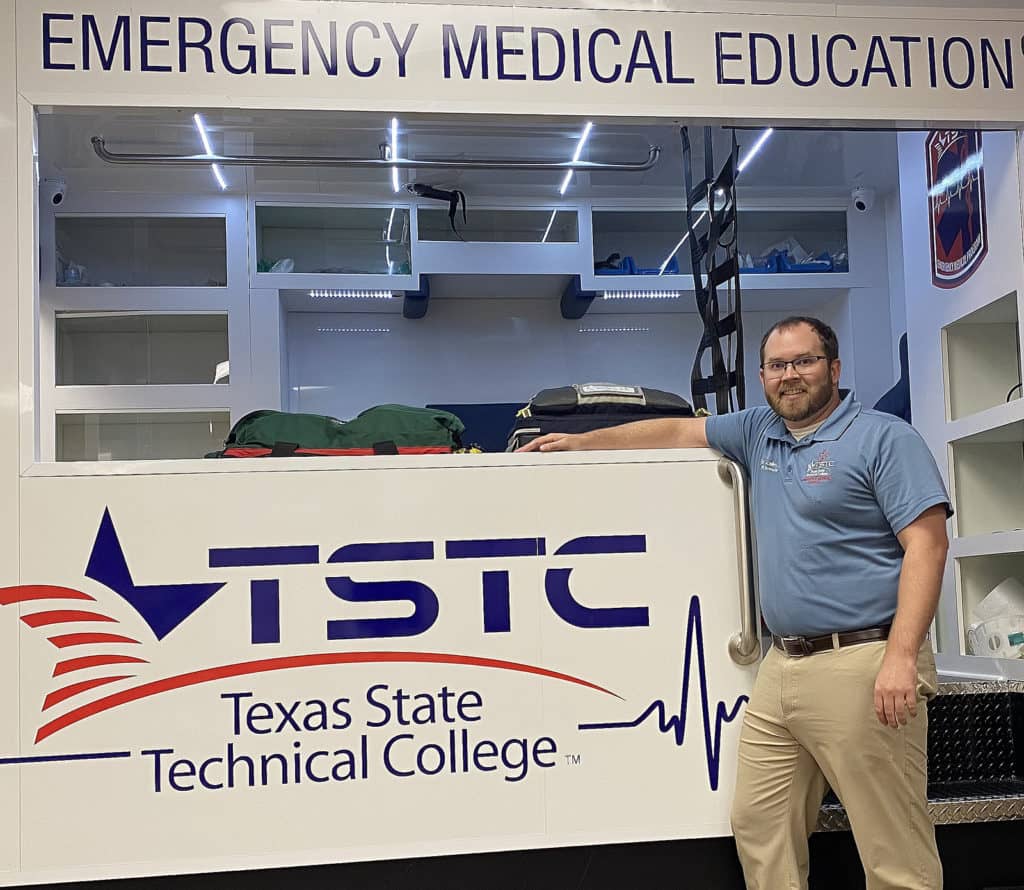
With nine years of field experience, Tim Scalley is bringing a unique perspective to Texas State Technical College’s Emergency Medical Services program.
Before beginning his time as the EMS instructor at TSTC in Brownwood, Scalley worked as a paramedic for five years and spent four years serving as a flight medic.
His time working as a flight medic showed him that he had a second calling.
“When I started working at Air Evac Lifeteam, they trained me to teach the American Heart Association CPR and advanced-level courses to their industry partners,” Scalley said. “Initially it was just for the extra pay, but then I began loving the education aspect, as well getting to watch the students interact with each other and learn. It is always rewarding to see a student’s ‘light bulb’ turn on when they grasp a concept they have been struggling with before.”
Scalley is preparing the next group of paramedics and emergency medical technicians, knowing they will become well-trained first responders.
What makes the program at TSTC different?
The instructors. We are all passionate about our students’ success, as well as the type of student we put out for our industry partners. We not only strive to make sure the students are well prepared to handle any EMS call, but also have the mental fortitude to handle the EMS industry.
What is the career outlook for EMTs and paramedics?
Very good. I cannot recall a student that graduated that was not able to land a job within a few weeks of seeking employment. There is always a shortage of both EMTs and medics in the area.
What do you enjoy most about your career?
Getting to use all the amazing training equipment that the college provides for us. It is amazing to see how, just like the EMS industry itself, the training equipment has advanced since a decade ago when I went through TSTC as a student for my paramedic. Running simulated patient calls with the students in the ambulance simulator, getting to change the scenarios on the fly based off of the treatment the students provide the manikins, and then the students themselves getting to see those changes on the simulated cardiac monitors that look like the real thing — the simulations are my favorite part because so many light bulbs get turned on during them.
Do you have a favorite memory at TSTC?
Getting to watch my students walk the stage and receive their degrees after spending countless hours in the lab with them would be my favorite memories. Knowing that all their hard work and determination has paid off and they will be riding in an ambulance in less than a month.
What do you enjoy most about teaching future first responders?
Knowing that every student we graduate is benefiting the local area’s patient care and providing more EMS workers to the area to provide high-quality care.
What advice do you give your students once they complete the program?
Once they complete the program, they still are not certified in Texas to work as EMTs or paramedics. They still have to pass their national examination process and then apply to the state to be certified. The best piece of advice is not to wait on that process. Take a few weeks to study/prepare for that national exam. The longer they wait to take it, then the chances of passing get smaller and smaller due to how long they have been out of class.
Once they are certified and working, though, the advice would be always to be a patient advocate in every sense of the word. Be compassionate, be caring, be respectful, fight for your patients and their rights. Remember that EMS is not always the blood and guts, but also the 2 a.m. earache calls. Treat them all the same. It might not be an emergency in their eyes, but it is to their patients.
Registration for the fall semester is underway. Scholarships are available. For more information, visit tstc.edu.